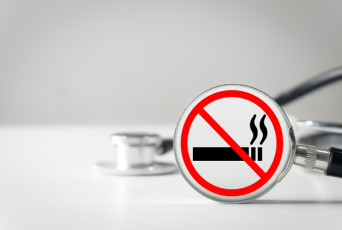
Breast Cancer Treatment
UHS provides those diagnosed with breast cancer access to comprehensive care, state-of-the-art technology and a multispecialty team to coordinate the best breast cancer treatment options for you in New York's Southern Tier. Some brief information is provided below about several treatment options available at UHS. This information may be helpful when you speak with your healthcare provider.
The treatment options available to you will depend on a number of factors including:
- The type of tumor
- The extent of the disease at the time of diagnosis
- Your age
- Your medical history
Your personal feelings about treatment, your self-image, your family history and your lifestyle will also be important considerations in your healthcare provider’s assessment and recommendations. You and your physician should discuss these treatment methods and how they apply to your situation. Understanding all your options from the beginning of your diagnosis allows you to have all of the information you need to make an informed and rational decision about your New York breast cancer treatment from UHS.
Lumpectomy
During a lumpectomy, both the tumor and a wedge of normal tissue surrounding the cancer are removed. A margin of normal tissue must be cut out to ensure the tumor has been completely removed. Lumpectomy is followed by approximately 6 weeks of radiation therapy administered at our breast cancer treatment center in New York's Southern Tier.
Mastectomy
Mastectomy is the surgical removal of the breast; it refers to a number of different procedures, including modified radical mastectomy, total (or simple) mastectomy, nipple-sparing mastectomy and radical mastectomy. Based on the size and location of the mass in your breast, your surgeon will recommend the type of surgery that offers you the best chance of successful treatment.
Sentinel Lymph Node Biopsy
Sentinel node biopsy is a surgical procedure used to determine if cancer has spread beyond a primary tumor into your lymphatic system. Sentinel node biopsy involves injecting a tracer material that helps locate the sentinel nodes during surgery. The sentinel nodes are removed and analyzed by a pathologist.
Axillary Node Dissection
Axillary node dissection involves removing at least 6 of the lymph nodes under the arm. These nodes are then sent to a pathologist to be checked for cancer.
Radiation Therapy
Radiationtherapy (also called radiotherapy) uses high-energy rays to kill cancer cells. It affects cells only in the part of the body that is treated. Radiation therapy may be used as a part of our breast cancer treatment in New York after surgery to destroy breast cancer cells that remain in the area.
Chemotherapy
Chemotherapy uses drugs to kill cancer cells. The drugs that treat breast cancer are usually given through a vein (intravenous) or as a pill. Most women receive a combination of drugs. The side effects of chemotherapy depend mainly on which drugs are given and how much. Chemotherapy kills fast-growing cancer cells, but the drugs can also harm normal cells that divide rapidly.
Hormone Therapy
Hormone therapy is also called anti-hormone treatment. If lab tests show that the tumor in your breast has hormone receptors, then hormone therapy may be an option. Hormone therapy keeps cancer cells from getting or using the natural hormones (estrogen and progesterone) they need to grow.
-
 Know where to go for your medical concernFebruary 16, 2026
Know where to go for your medical concernFebruary 16, 2026It can be tough to distinguish where to go for medical care when your symptoms feel unbearable, and your primary care provider is unavailable. Here are some key differences to help you decide.
-
 UHS supports tobacco cessation in partnership with St. Joseph's HealthFebruary 13, 2026
UHS supports tobacco cessation in partnership with St. Joseph's HealthFebruary 13, 2026UHS is pleased to announce its continued collaboration with the Central New York Regional Center for Tobacco Health Systems at St. Joseph's Health. Through this partnership, UHS has strengthened its tobacco-dependence treatment policy, aligning it with the Public Health Service Clinical Practice Guidelines.
-
 UHS Pediatrics Upper Front Street holds ribbon-cutting ceremonyFebruary 13, 2026
UHS Pediatrics Upper Front Street holds ribbon-cutting ceremonyFebruary 13, 2026On Thursday, February 12, UHS hosted a ribbon cutting to celebrate the opening of UHS Pediatrics Upper Front Street. The practice, which previously served patients on Chenango Bridge Road, welcomed its first patients at the new location on February 2.
-
 Spotlighting heart health awareness with ‘Go Red for Women’ campaignFebruary 10, 2026
Spotlighting heart health awareness with ‘Go Red for Women’ campaignFebruary 10, 2026People across the country – and throughout the Southern Tier – wore red on Friday, February 6, to raise awareness of heart disease in women as part of National Wear Red Day, a cornerstone of the American Heart Association’s Go Red for Women campaign.


